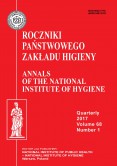Rocz Panstw Zakl Hig 2015, 66(4): 373-377
Effect of probiotic and storage time of thiamine and riboflavin content in the milk drinks fermented by Lactobacillus casei KNE-1.
[Effect of probiotic and storage time of thiamine and riboflavin content in the milk drinks fermented by Lactobacillus casei KNE-1.]
ABSTRACT
Background. Fermented milk drinks are unique products due to content of Lactobacillus and Bifidobacterium that are recognized as probiotics. They are a natural component of the colon microbiota as well as commonly used probiotics in functional food.
Objectives. The effects of the storage time and prebiotic type (inuline or oligofructose) were studied in banana-milk drink after fermentation by Lactobacillus casei KNE-1 on the thiamine and riboflavin concentrations.
Material and methods. The material for the study was fermented fruit milk drinks: banana-milk prepared in laboratory conditions and fruit milk drinks purchased in a local shop, as a comparative material. The thiamine was determined by thiochrome method and the riboflavin was determined by fluorometric method.
Results. The storage time after the end of the fermentation process did not increase the content of thiamine and riboflavin in fermented banana-milk drink more than the output level. The addition of oligofructose significantly affected the synthesis of thiamine by Lactobacillus casei KNE-1 irrespectively of the storage time. The storage time but not the type of prebiotic affected the riboflavin concentration. Taking into account the highest content of both vitamins, the banana-milk drink fermented by Lactobacillus casei KNE-1 should be consumed immediately or 24 days after fermentation.
Conclusions. This information could be used by manufacturers for the planning of technological process. The content of thiamine and riboflavin in the fermented milk drinks is the result of the type of prebiotic, the individual bacterial strain properties as well as the storage time. These factors should be investigated to optimize the content of B vitamins in fermented milk drinks in the future.
STRESZCZENIE
Wprowadzenie. Mleczne napoje fermentowane są produktami unikalnymi ze względu na zawartość bakterii probiotycznych rodzaju Lactobacillus i Bifidobacterium. Są one naturalnym składnikiem mikroflory okrężnicy, jak również powszechnie stosowane w żywności funkcjonalnej.
Cel badań. Celem badania była analiza wpływu czasu przechowywania i rodzaju dodanego prebiotyku (inuliny i oligofruktozy) na zawartość tiaminy i ryboflawiny w mlecznym napoju o smaku bananowym fermentowanym Lactobacillus casei KNE-1.
Materiał i metoda. Materiałem do badań były mleczne napoje fermentowana o smaku bananowym wytworzone w warunkach laboratoryjnych oraz fermentowane napoje mleczno-owocowe zakupione w handlu detalicznym, jako materiał porównawczy. Tiamina została oznaczona metodą tiochromową, a ryboflawina metodą fluorymetryczną.
Wyniki. Czas przechowywania po zakończeniu procesu fermentacji nie wpłynął na zwiększenie zawartość tiaminy i ryboflawiny w fermentowanych napojach o smaku bananowym w stosunku do poziomu wyjściowego. Dodanie oligofruktozy miało istotny wpływ na syntezę tiaminy przez Lactobacillus casei KNE-1, bez względu na czas przechowywania. Czas przechowywania, ale nie typ dodanego prebiotyku wpływał na koncentrację ryboflawiny. Biorąc pod uwagę najwyższą zawartość obu witamin w mlecznym napoju fermentowany przez Lactobacillus casei KNE-1, produkt ten powinien być spożywany natychmiast lub po 24 dniach fermentacji. 374 M. Drywień, J. Frąckowiak, M. Górnicka, et al. No 4
Wnioski. Wyniki naszych badań mogą być wykorzystywane przez producentów do planowania procesu technologicznego. Zawartość tiaminy i ryboflawiny w mlecznych napojach fermentowanych jest skutkiem właściwości poszczególnych szczepów bakteryjnych, jak i przechowywania. Czynniki te powinny być poddane dalszym badaniom w celu ich optymalizacji na zawartość witamin z grupy B w mlecznych napojach fermentowanych.
Downloads: 2113


